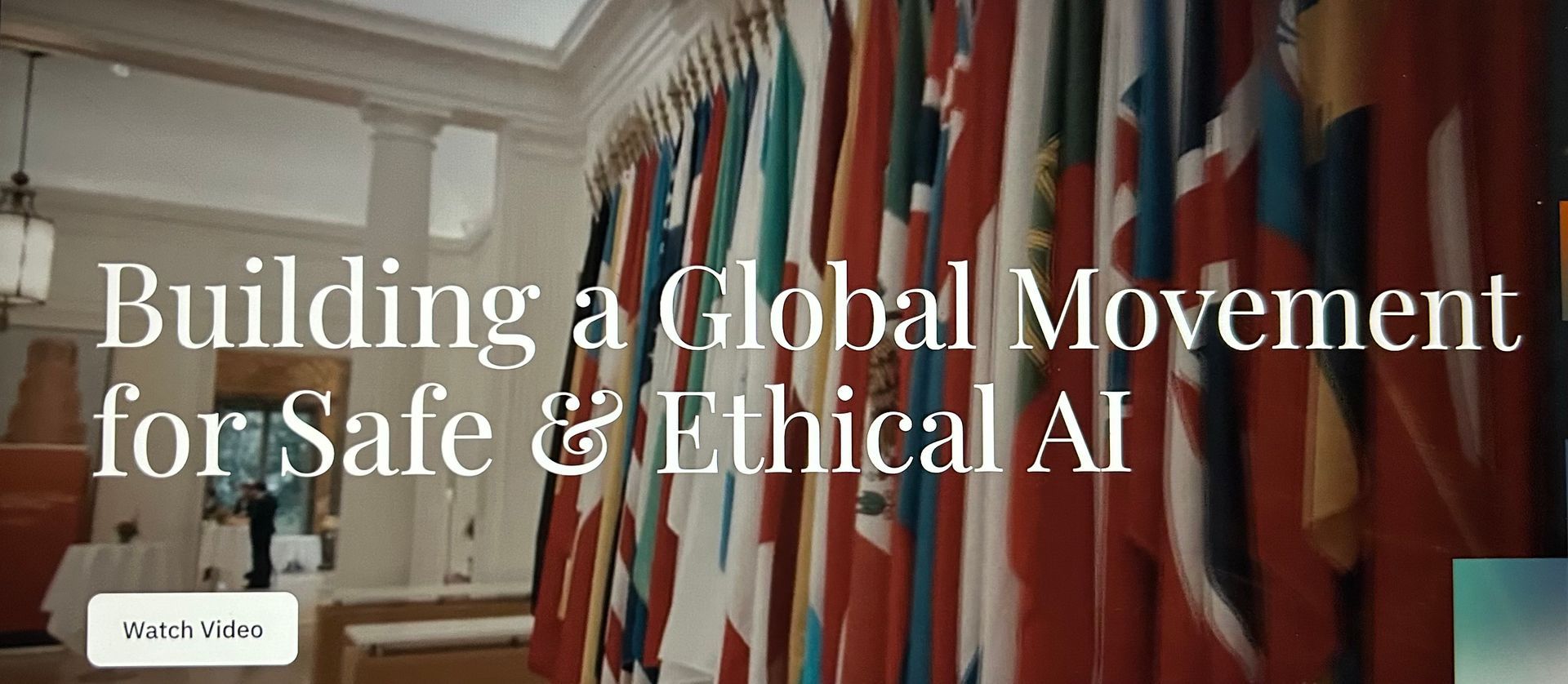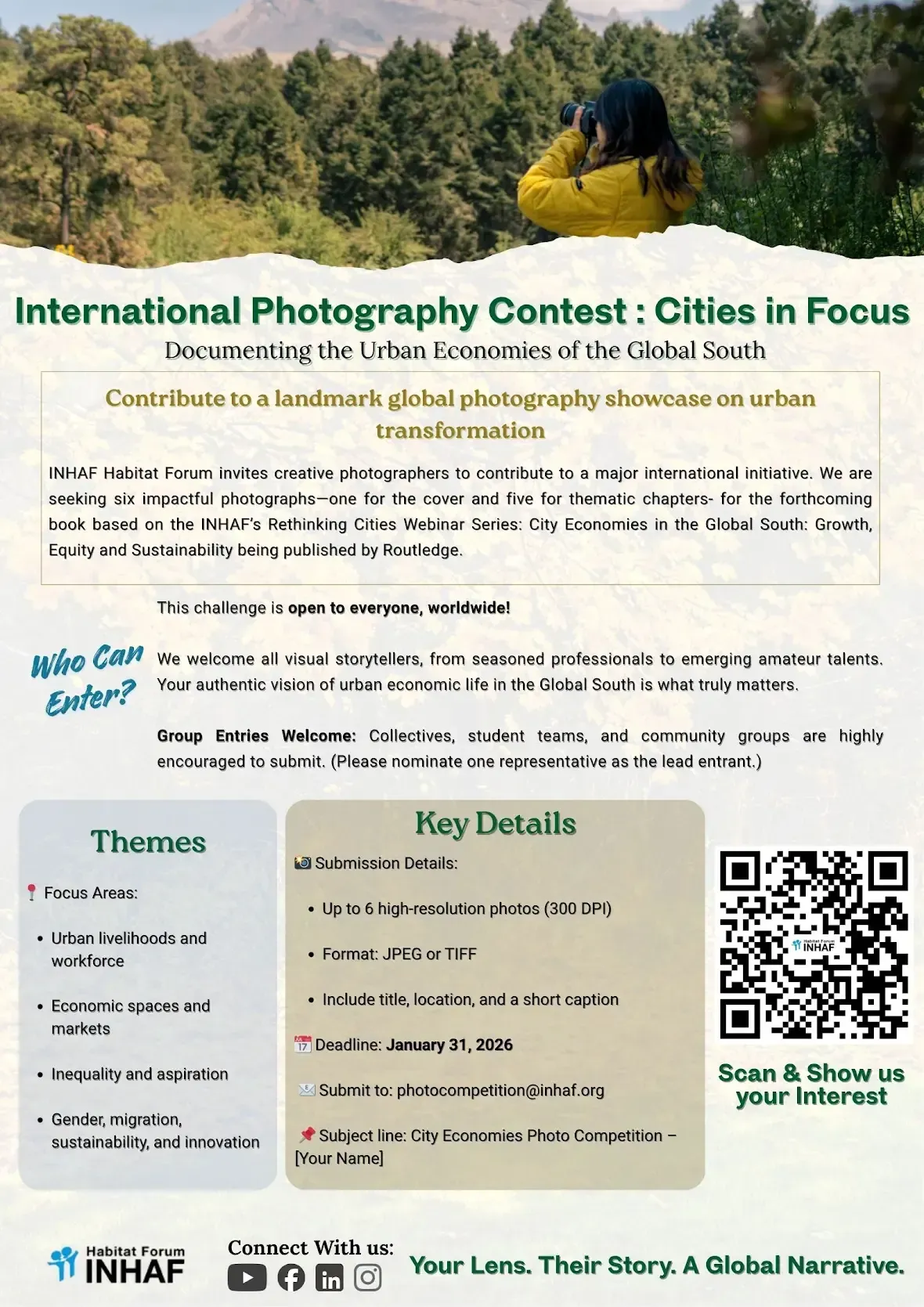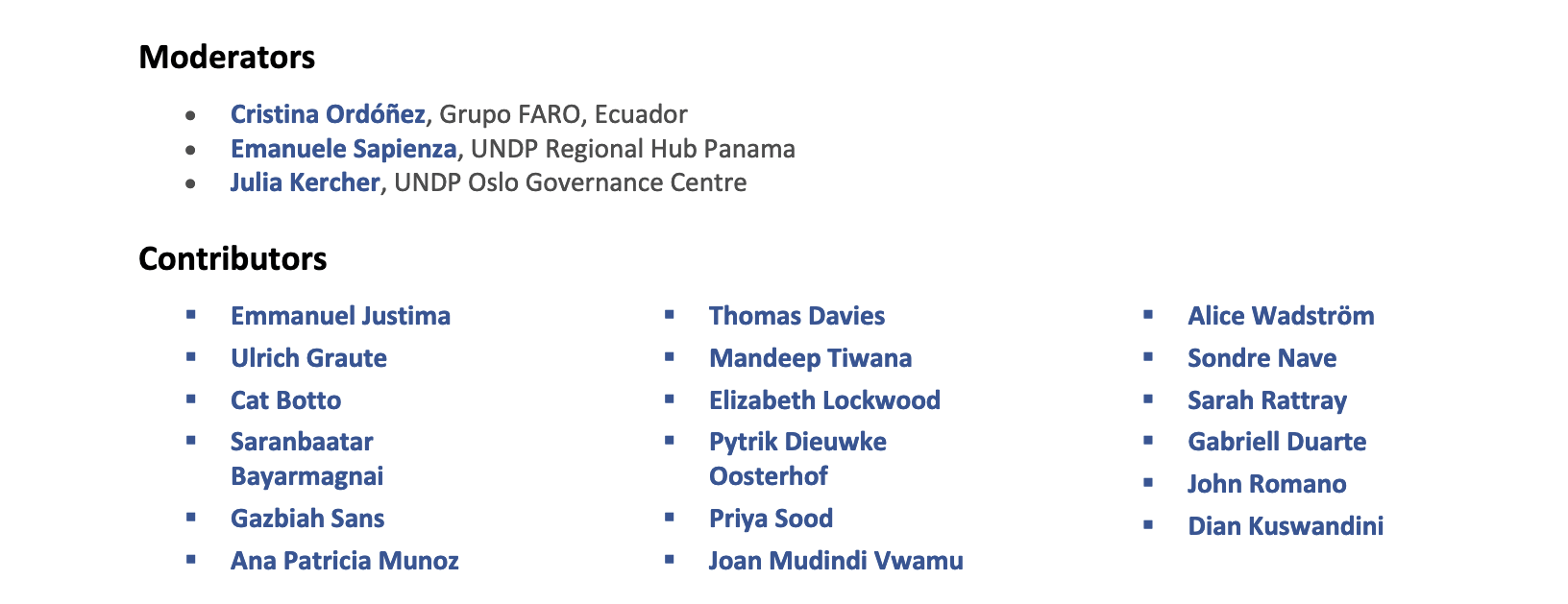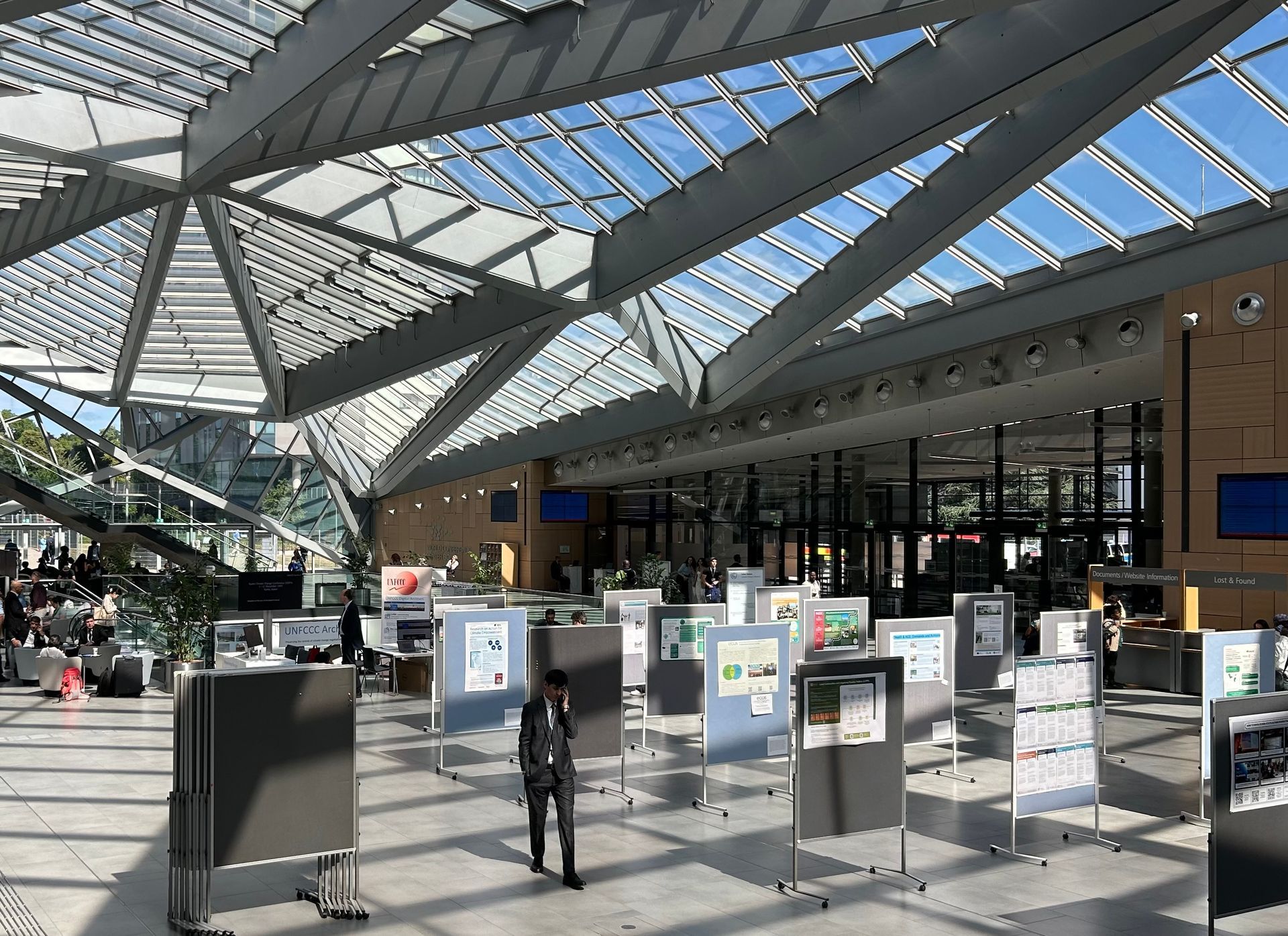Civic engagement and civic space - Summary of an e-Discussion on SDG 16 Trends and Emerging Issues in the Context of COVID-19

SDG16 Hub
Promote peaceful and inclusive societies for sustainable development, provide access to justice for all and build effective, accountable and inclusive institutions at all levels
Civic engagement and civic space, and on how the COVID-19 pandemic has affected progress towards establishing more ‘just societies’, as envisioned by SDG 16, and what is needed for an equitable recovery from this crisis.
The global health, economic and social crisis generated by the COVID-19 pandemic has dramatically highlighted the vulnerability of certain populations which have been disproportionately affected. Existing structural problems and inequalities have been exacerbated. The World Bank estimates that, in a worst-case scenario, an additional 115 million people will fall into extreme poverty due to the pandemic.
In this challenging environment, Civil Society Organizations (CSOs) play an essential role. CSOs that connect to and work with marginalized communities with a focus on advocacy and accountability are key to ensuring that human rights, transparency and citizen's participation are safeguarded. Furthermore, in an environment where governments face unprecedented economic negative shocks and need to decide what trade-offs to make, civil society organizations that focus their work on research and analysis are essential to promote decisions that are evidence-based. Without organizations that represent a wide range of people, we cannot build just, peaceful and inclusive societies that ¨leave no one behind¨.
Yet, even before the pandemic, civic space had been shrinking worldwide. According to the 2020 CIVICUS Monitor, only 3.4% of the world’s population lives in countries with open civic space. Governments’ efforts to curb infections have affected people’s civil and political rights, such as the freedom to assembly. While restrictions may be justified when their temporary nature and proportionality are ensured, there is also evidence that, in many contexts, the current situation has been used as a pretext to limit civil society action in a targeted and unjustified manner.
Framing Question #1:
Effective engagement between civil society and government
- Research seems to show a possible positive connection between social capital derived from civic engagement and lower levels of mortality from COVID-19.1
- Educational tools in West Africa were used to create CSOs to promote peaceful dialogue and to reduce community tensions in the context of Boko Haram/ISIS West Africa insurgency, with support from both traditional leaders and local government representatives.
- CIVICUS’s Solidarity in the Time of COVID-19 brings examples where CSOs took on crucial roles in service provision, food and sanitary equipment distribution, addressing disinformation by public outreach programmes on effective prevention measures.
- The Rebuilding for Good paper developed by the Affinity Group of National Associations, Charities Aid Foundation and CIVICUS identifies good examples in relation to COVID-19 response, and outline suggestions for the government to support civil society.
- The Stakeholder Group of Persons with Disabilities (SGPwD)’s research on the experiences of persons with disabilities with COVID-19 shows that, while new and exacerbated barriers for persons with disabilities arose in several areas, the role of organizations of persons with disabilities became increasingly important.
- Strengthening Accountability and Integrity Systems (SPAIS) selected 8 CSOs in Kenya to implement pilot interventions on transparency and accountability in the health sector, aiming at strengthening the capacities of key stakeholders towards transparent and accountable governance.
- In Tunisia’s ‘post-transition’ context, civil society plays a significant role in strengthening democratic, inclusive and participatory governance, and in bridging the gaps in the service chain between public institutions and citizens.
- UNDP Oslo Governance Centre and UN DESA’s framework to analyse the Quality of Stakeholder Engagement can be a useful tool to analyse the process of stakeholder engagement in the beginning of the VNR process
- SDG16+ Civil Society Toolkit, to be launched at the HLPF 2021, can be a useful resource for civil society partners to unpack SDG16+ in their own contexts, and support practitioners on utilizing and maximizing SDG16+ work to enhance their work.
- More focus should be placed on NHRI and the important role they can play, particularly on working on civic space issues and supporting civil society.
- Human Rights Defenders should be better supported, given the increasing risks they face globally.
1 (Elgar et al 2020).
Framing Question # 2:
How COVID-19 related measures have affected civic engagement
- 2021 State of Civil Society Report highlights that decentralised movements for racial justice and gender equality are challenging exclusion and demanding a radical reckoning with systemic racism and patriarchy.
- Women-led movements are challenging gender stereotypes, exposing patterns of exclusion, and forging breakthroughs to lay the groundwork for fairer societies.
- Young people are at the forefront of protest and have taken ownership of climate change to make it a decisive issue of our time, through, for example, the Fridays for Future movement.
- Present day movements are deriving strength by taking the shape of networks rather than pyramids, with multiple locally active leaders. Unsurprisingly, powerful people’s mobilisations are inviting sharp backlash.
- The mobility measures imposed by the governments led to prohibition of public demonstrations at a time of greater tension and citizen discontent with the mismanagement of the pandemic crisis.
- The “Spiral of Silence”, strategy used by governments to hinder civic space by inducing fear to silence communication channels, was exemplified by Belarus.
- Counter-terrorism laws need reformulating, since their vagueness might hinder CSOs safety, lead to human rights violations, and serve as a tool for governments to reduce dissent and criticisms.
- Two policy briefs developed by CIVICUS reveal a plethora of measures to limit the space for civil society to operate and discharge their vital contributions.
Framing Question #3:
How new online spaces have affected participation
- The development of innovative digital mechanisms has provided new channels to exercise freedoms of association, assembly, and expression, and helped democratize exchanges.
- Because the COVID-19 pandemic has fundamentally changed how we've worked (digitally) over the past year, there is a need to ensure that we're learning from and building upon some of the things that this virtual engagement has led to – namely, bringing many more voices to conversations.
- Engagement must happen by ensuring accessible online participation, such as supporting of cross-cutting solutions, promoting effective access to information, prioritizing accessible platforms, facilitating accreditation and registration of participants, and ensuring safety of participation channels.
- Some of the risks involve cybersecurity, digital divide and censorship.
- The Stakeholder Group of Persons with Disabilities’ COVID-19 research has found that online spaces are creating more exclusion and additional barriers for persons with disabilities, including lack of access to COVID-19 information and barriers in receiving social protection measures and employment.
- Some online platforms have worked diligently to add accessibility features during the pandemic, such as Zoom, but this does not create inclusion for people who do not have the ability or means to access the internet.
- In the absence of the "traditional" ways to promote capacity building, coordination, and advocacy (i.e., through workshops, conferences, etc.), there is a need to re-think how to work at the national and local level in a post-pandemic world. The Mainstreaming SDG 16 resource provides detailed guidance which can be used in the absence of direct in-country support to maximize learning among partners.
Other emerging questions
On the role of the United Nations
- The cutback in international cooperation has negatively affected CSOs.
- In spite of existing examples of UN funding CSOs projects, such as by the UNDEF and the UN Peacebuilding Fund’s Gender and Youth Promotion Initiative, it was suggested that the funding of CSOs by the UN could stretch UN capacities, create dependency, and risk be seen as biased.
- Alternatively, it was suggested that the UN focuses on well-funded country offices and agencies; on capacity development and funding of thematic activities; on protection of civil society actors; and on promotion of an enabling, safe and free civic space in national decision-making processes.
- Need for joint strategizing, solidarity, and equal partnership between the UN and civil society, given that siloed approaches might lead to competition and hostility among groups and/or issues.
On civil society representation through Voluntary National Reviews (VNR)
- Civil society engagement in VNR design, delivery and follow-up is fundamental to accountability and to the whole-of-society approach, reflects inclusive and effective governance and decision-making, and helps to ensure that SDG 16-related provisions in a VNR are taken forward.
- Leveraging and empowering civil society and their proximity to local communities and grassroots groups further bolsters government responsiveness to various segments of society, ensuring that a greater diversity of voices is heard, in keeping with a “leave-no-one-behind” approach.
- Civil society engagement can take the form of ‘Spotlight Reports’ and related follow-up. Spotlight Reports help to ensure an independent and robust assessment of progress. They can challenge, complement, or question member state reports, promote government accountability, provide a global platform for local civil society voices and set the stage for follow-up action, often with or alongside government partners.
- The sharing of experiences and lessons learned from COVID-19 should be encouraged to enable analysis of potential setbacks CSOs have experienced due to the pandemic.
- Given the non-official status of Spotlight Reporting, exploring ways to better utilize and share feedback from CSO reporting could help strengthen civic engagement and space in the overall efforts to achieve sustainable development. This can be done by:
- Fostering integrated reporting on the SDGs;
- Institutionalizing approaches to strengthen more inclusive reporting;
- Establishing a UN platform or a database for civil society reporting on the SDGs to help collect and disseminate Spotlight Reports, as well as facilitate joint guidance, enable analyses, and document lessons learned;
- Similar considerations could be made for regular submissions to Human Rights Treaty Bodies as well as the Universal Periodic Review.
- Example of integrated VNR reporting:
- Finland's 2020 VNR, where for each goal the government assessment is followed by a civil society assessment.
- Malawi also took a very comprehensive approach and engaged with a wide and diverse spectrum of populations.
- Norway’s 2021 VNR process, based on the Finish model of 2020, is another good example of effective engagement between civil society and government during the pandemic.
- Data partnerships between national statistical systems, youth organizations, civil society, local and regional governments (LRGs), international organizations and others provide another channel for civil society engagement.
- Disaggregated data (based on gender, disability, rural communities, indigenous populations etc.) should be recognized and incorporated into VNRs.
- Local and regional governments with strong, democratic and accountable institutions are prerequisites for achieving SDG 16. Particularly now as communities globally continue to struggle with COVID-19
Resources
Ashish Kothari et al., Pluriverse: A Post-Development Dictionary
ASIES: Gobernabilidad y Covid 19: Su Impacto en el Área Política, Educativa, Jurídica y Económica CIVICUS: 2021 State of Civil Society Report, Chapter 5
CIVICUS: Solidarity in the Time of COVID-19
EDGE Webinar: Weaving Systemic Alternatives from the Global South; Questions & Answers
Elgar et al (2020): The trouble with trust: Time-series analysis of social capital, income inequality, and COVID-19 deaths in 84 countries
Front Line Defenders: Global Analysis 2020
GANHRI: Marrakech Declaration: “Expanding the civic space and promoting and protecting human rights
defenders, with a specific focus on women”
GIZ, TAP Network: SDG 16 in VNRs and Spotlight Reports
Global Alliance, White & Case: Analysis of the 2020 Voluntary National Reviews and SDG 16 Global Alliance blog: Civic Space: Why it Matters
Global Tapestry of Alternatives: Webinar series
The Guardian: At least 331 human rights defenders were murdered in 2020, report finds IISD: Will the SDGs Still be Relevant after the Pandemic? A Disability Rights Perspective International Center for Not-For-Profit Law: COVID-19 Civic Freedom Tracker International Civil Society Centre: Solidarity Playbook
International Disability Alliance : Accessibility Guides
International Disability Alliance: COVID 19 and the disability movement
International Disability Alliance: Overview on Accessibility of Video Conferencing Apps and Services International Disability Alliance: Resources and Tools for Action
International Disability Alliance:
The experiences of persons with disabilities with COVID-19
International Disability Alliance: Voices of People with Disabilities During the COVID19 Outbreak Latinobarometro 2018
OHCHR, GANHRI, UNDP: COVID-19 and National Human Rights Institutions,
OHCHR, GANHRI, UNDP:
Tripartite Partnership to support NHRIs with OHCHR and GANHRI
Partners4Review: Voluntary National Reviews submitted to the 2019 High-level Political Forum for Sustainable
Development – a Comparative Analysis
Partners4Review: 2020 Voluntary National Reviews – a snapshot of trends in SDG reporting Secretary General: Role of the United Nations in protecting and promoting civic space
TAP Network and the Global Alliance for Reporting Progress on Peaceful, Just and Inclusive Societies:
Mainstreaming SDG 16: Using the Voluntary National Review to Advance More Peaceful, Just and Inclusive Societies.
UN Sustainable Development: Finland’s VNR 2020
UN Sustainable Development: Voluntary common reporting guidelines for voluntary national reviews at the high-
level political forum for sustainable development (HLPF)
UNDP/DESA: What is a good practice? Analytical Framework to analyse and strengthen the quality of stakeholder
United Nations: Guidance Note: Protection and Promotion of Civic Space. United Nations: Secretary General’s Call to Action for Human Rights United Nations: World Youth Report (WYR)
UNDP: NHRIs and COVID-19
UNDP’s Development Dialogues: Building A Better, Fairer Future For The Furthest Behind
Policies and Governance for Resilient and Sustainable Cities and Regions










